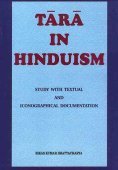Annihilation, Annihilated, Annihilate: 2 definitions
Introduction:
Annihilation means something in Hinduism, Sanskrit. If you want to know the exact meaning, history, etymology or English translation of this term then check out the descriptions on this page. Add your comment or reference to a book if you want to contribute to this summary article.
In Hinduism
Ayurveda (science of life)
Source: INSA Digital Repository: Caraka’s Approach to KnowledgeAbsolute Annihilation refers to the “ultimate state” according to Charaka Samhita Sharira verse 1:98-100.—[...] Caraka’s evolution (parinama) is not open ended like Darwin’s evolution; parinama will terminate in infinite time and the universe with its stupendous diversity will dissolve into avyakta to begin the cyclical process of evolution again. The whole process has no external control and is deaf to human supplications. The ultimate state is absolute annihilation or an indefinable Brahman state. This conception would place Caraka among the best of ancient Indian philosophers.

Āyurveda (आयुर्वेद, ayurveda) is a branch of Indian science dealing with medicine, herbalism, taxology, anatomy, surgery, alchemy and related topics. Traditional practice of Āyurveda in ancient India dates back to at least the first millenium BC. Literature is commonly written in Sanskrit using various poetic metres.
Shaktism (Shakta philosophy)
Source: Google books: Genesis and Development of Tantra (Shaktism)Annihilation (in Sanskrit: Jambhana) refers to one of the twelve kinds of Black Magic (abhicāra) which represents one of the various Supernatural Powers (siddhi) according to the Siddhayogeśvarīmata: an ancient Sanskrit text devoted to cults of Goddesses as the Vidyāpīṭha or Vidyā Corpus.—In the Siddhayogeśvarīmata, the objectives of rituals are classified as siddhis [e.g., twelve kinds of black magic (abhicāras) such as annihilation (jambhana)]. They belong to the category of supernatural phenomena and seem to be considerably different from the types of wish people expected to gain from the Vedic rituals that still remained within the sphere of everyday life.

Shakta (शाक्त, śākta) or Shaktism (śāktism) represents a tradition of Hinduism where the Goddess (Devi) is revered and worshipped. Shakta literature includes a range of scriptures, including various Agamas and Tantras, although its roots may be traced back to the Vedas.
See also (Relevant definitions)
Ends with: Self-annihilation.
Full-text (+541): Mahapralaya, Pralaya, Vipralaya, Pradhvasta, Uccheda, Dhakk, Nakk, Bhedika, Vibhava Tanha, Samhara, Akkadu, Vinasha, Khepita, Nashta, Ucchedaditthi, Avakhand, Kshayopashama, Nirodheti, Pranashta, Mahapralay.
Relevant text
Search found 239 books and stories containing Annihilation, Annihilated, Annihilate; (plurals include: Annihilations, Annihilateds, Annihilates). You can also click to the full overview containing English textual excerpts. Below are direct links for the most relevant articles:
Chaitanya Bhagavata (by Bhumipati Dāsa)
Verse 2.16.61-065 < [Chapter 16 - The Lord’s Acceptance of Śuklāmbara’s Rice]
Verse 3.5.595-596 < [Chapter 5 - The Pastimes of Nityānanda]
Verse 2.17.113 < [Chapter 17 - The Lord’s Wandering Throughout Navadvīpa and Descriptions of the Devotees’ Glories]
Buddhism in a Nutshell (by Narada Mahathera)
The Skanda Purana (by G. V. Tagare)
Chapter 14 - Kālarātri Annihilates the Universe < [Section 3 - Revā-khaṇḍa]
Chapter 16 - Eulogy of Śiva by Brahmā < [Section 3 - Revā-khaṇḍa]
Chapter 19 - Incarnations of Śrī Viṣṇu < [Section 1 - Prabhāsa-kṣetra-māhātmya]
Brahma Sutras (Shankaracharya) (by George Thibaut)
III, 2, 21 < [Third Adhyāya, Second Pāda]
IV, 1, 15 < [Fourth Adhyāya, First Pāda]
IV, 4, 2 < [Fourth Adhyāya, Fourth Pāda]
Vaisheshika-sutra with Commentary (by Nandalal Sinha)
Sūtra 1.1.12 (Difference of Substance from Attribute and Action) < [Chapter 1 - Of Substance, Attribute, and Action]
Sūtra 2.1.7 (Above continued) < [Chapter 1 - Of Earth, Waters, Fire, Air, and Ether]
Sūtra 9.1.2 (Consequent non-existence also is proved by perception and inference) < [Chapter 1 - Of Ordinary Perception of Non-Existence and of Transcendental Perception]
Chandogya Upanishad (Shankara Bhashya) (by Ganganatha Jha)
Section 7.11 (eleventh khaṇḍa) (three texts) < [Chapter 8 - Eighth Adhyāya]
Section 7.12 (twelfth khaṇḍa) (six texts) < [Chapter 8 - Eighth Adhyāya]
Section 6.2 (second khaṇḍa) (four texts) < [Chapter 6 - Sixth Adhyāya]
Related products

